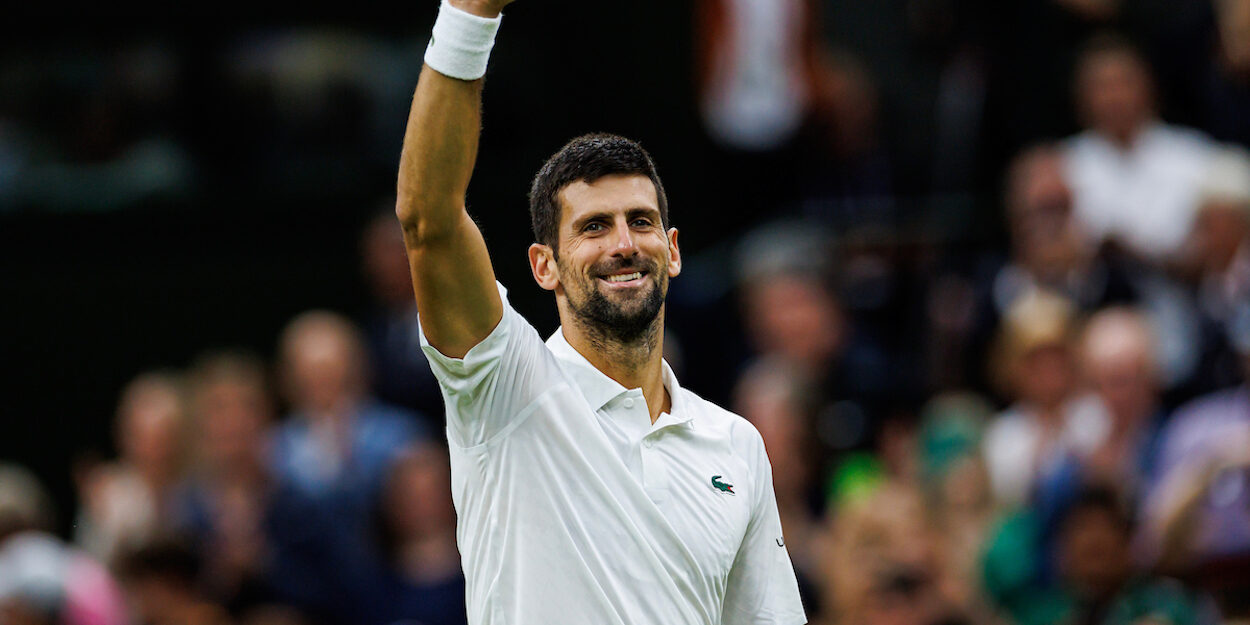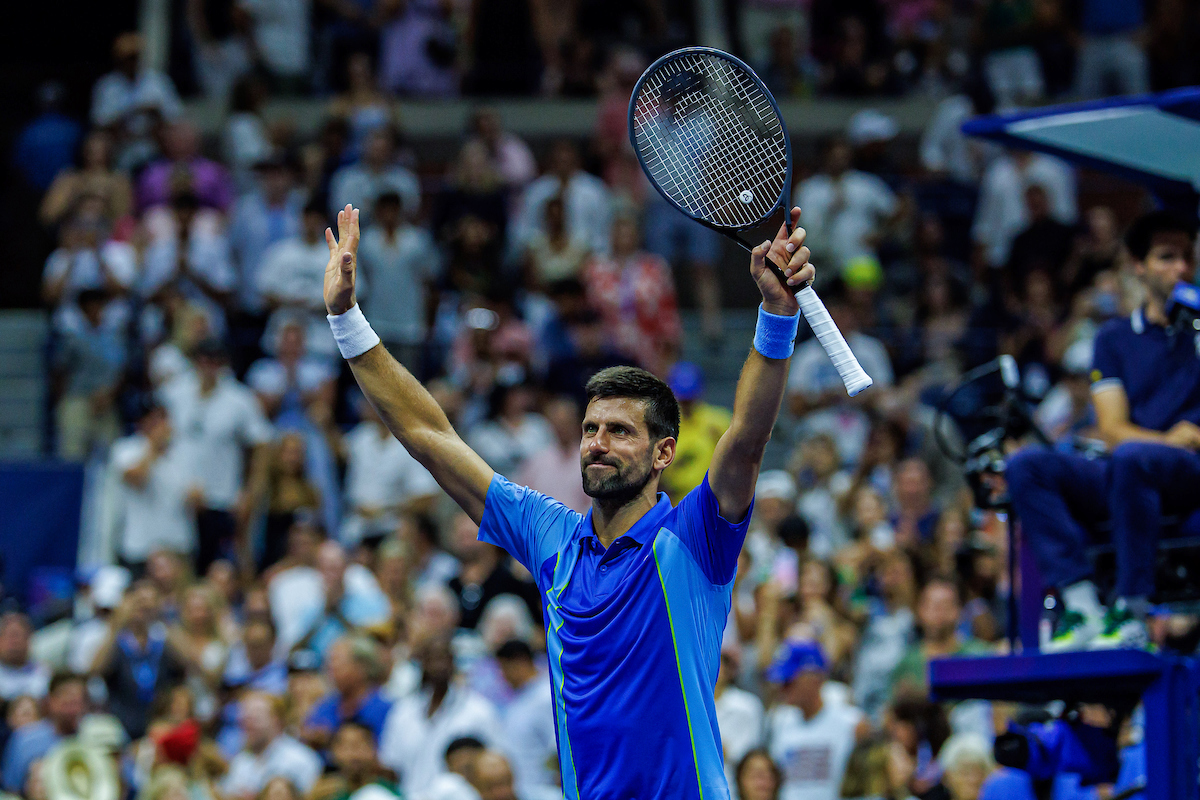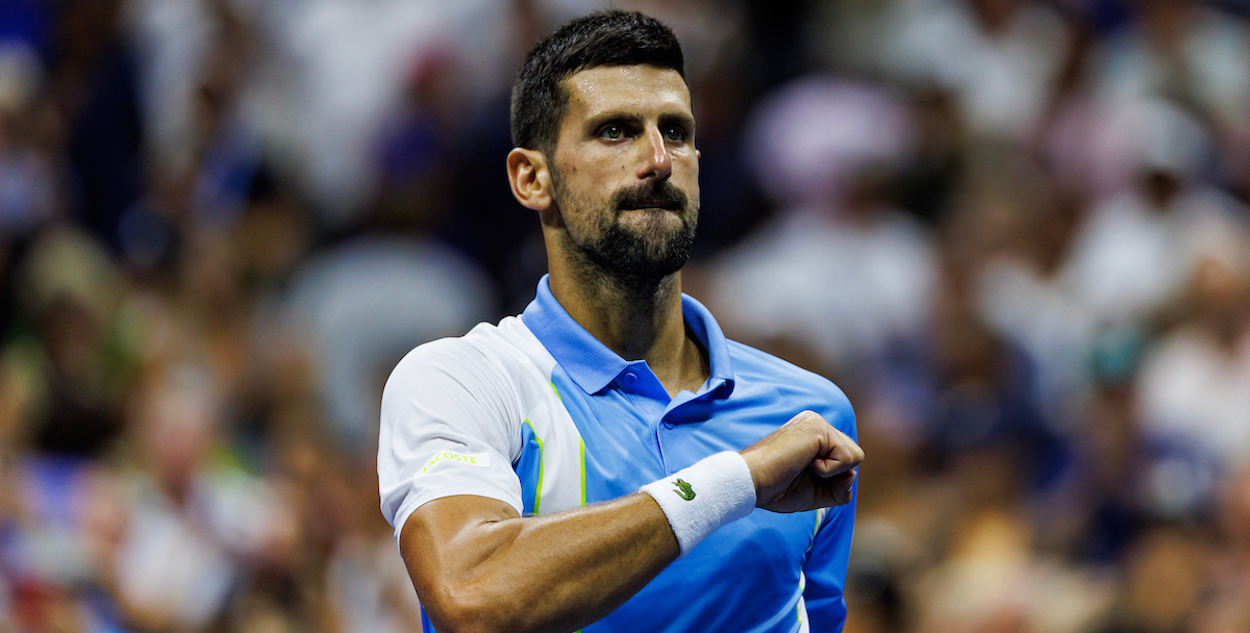
The Novak Djokovic show will go on in 2024 – and likely far beyond
Novak Djokovic says he is not contemplating retirement and will focus more than ever on Grand Slam tournaments in the future. Paul Newman says that remaining motivated is likely to be key to how long the 36-year-old extends his all-conquering career.
After Novak Djokovic won the Australian Open in 2008 he was determined not to look too far ahead. “It’s my first Grand Slam,” he said at the time. “I’m very happy about that. I’m going to take it easy. I’m going to try not to think about reaching even higher goals right away. I’m not in a rush.”
Nearly 16 years later the Serb is still happy with his lot and certainly in no mood to rush into retirement. “As long as I’m one of the main contenders for the Grand Slams and winning the biggest tournaments in sport, I will not leave it,” he says.
At the age of 36, Djokovic is playing as well as he ever has. This was the third year (after 2015 and 2021) in which he went within one match win of becoming the first man since 1969 to achieve a pure calendar-year Grand Slam of the sport’s four biggest titles. Indeed, he went closer than ever to matching Rod Laver’s feat, his only Grand Slam loss coming against Carlos Alcaraz in a desperately tight Wimbledon final.
Djokovic’s only subsequent defeat in 2023 was against Jannik Sinner in the group stage of the year-end ATP Finals, a loss which he immediately avenged in the final to become the first man to claim the title seven times. He also became the first man to top the world rankings for 400 weeks.
Having won his 24th Grand Slam singles title at this year’s US Open – he now matches Margaret Court’s all-time record total and has won two more than any other man – Djokovic is ready to make more history. If he wins Wimbledon again he will become the oldest All England Club champion in the open era and will match Roger Federer’s men’s record of eight Wimbledon singles titles. If he wins any of the four Grand Slam titles from next year’s US Open onwards he will replace Ken Rosewall as the oldest men’s Grand Slam singles champion in the open era.
What an ???????????? season for Novak Djokovic! ???
We count down the world No. 1’s ???? ????? of the 2023 season ? pic.twitter.com/E0cTh5tmHP
— Eurosport (@eurosport) December 22, 2023
Until recently the talk in men’s tennis was of the supremacy of so many thirty-somethings and the longevity of modern-day players. Five years ago, for example, six of the world’s top seven players were in their thirties. However, the retirements of the likes of Federer and David Ferrer, combined with the physical decline of men like Rafael Nadal and Andy Murray, have meant that Djokovic has suddenly become the exception. After Wimbledon this summer, he was the only man in the world’s top 20 over the age of 27, while all of this year’s men’s Grand Slam quarter-finalists other than Djokovic were aged 27 or under.
On a purely physical level, Djokovic is a phenomenon. His powers of endurance and recovery, his speed of foot, the strength of his joints and his flexibility make him arguably the most extraordinary athlete in tennis history. Watching him prepare for a match or a training session is an education in itself as he contorts his body into seemingly impossible positions.
READ NEXT: Tennis Quiz! 20 questions to test your knowledge of the 2023 season
He also has a remarkable capacity to play through injuries. Goran Ivanisevic, his coach, said that Djokovic went into this year’s Australian Open with a hamstring injury that would have forced “97 per cent of other players” out of the tournament. Yet not only did he play with the injury but he also won the title.
Federer enjoyed similar longevity to Djokovic, but the Swiss was an attacking player who liked to finish points quickly and avoid long rallies. Djokovic, in contrast, made his name as a counter-puncher who wears opponents down with his relentless ability to make them play an extra ball.

With physical reasons therefore unlikely to disrupt Djokovic’s continued pursuit of excellence, staying motivated could be more crucial to his ability to remain at the top. “Goals are important to motivate you so that you have clarity in your preparation, in what you do on a daily or a weekly basis in order for you to reach the destination where you’re headed,” he says. “I think that’s super-important for every athlete.”
After he completed a career Grand Slam by winning the French Open in 2016, Djokovic did not win a major title for the next two years. He admitted later that one of the reasons was his loss of motivation after he had finally achieved his goal of winning the only Grand Slam title missing from his collection. He also acknowledges that over the last three years he has been driven on by a desire to beat the records for the number of men’s Grand Slam titles won and the number of weeks on top of the world rankings.
READ NEXT: Novak Djokovic on whether he is the GOAT: ‘We can suggest three answers…’
Now that those targets have been achieved, might his desire wane again? Djokovic does not think so. “My greatest motivation is still my love for the game,” he says. “I really like competing. It’s as simple as that. And then I always have goals – to win another Slam, to be world No 1 again, to finish the year as No 1. Those are the big goals. And of course next year is the Olympic Games.”
He added: “Occasionally I do ask myself: ‘Why do I still need this at this stage after all I have done? How long do I want to keep going?’ I do have these questions in my head, of course, but knowing that I still play at such a high level and win the biggest tournaments, I don’t want to leave this sport if I’m still at the top, if I’m still playing the way I’m playing now.”
Djokovic, for whom a first Olympic gold medal in singles is likely to be a major target next year, has won seven of the last 10 Grand Slam tournaments he has contested (and reached the final of two of the others). However, what if his level were to dip, to the point where he was no longer the world’s best player?

Given that 20 and 21-year-olds like Alcaraz, Holger Rune, Lorenzo Musetti and Ben Shelton – the first three of whom have all beaten Djokovic already – have so much room for improvement, the challenges to the Serb’s supremacy look certain to grow. If the young guns get the better of him too many times, might his retirement come sooner than he or anyone else currently expects? If, for example, he has not won any more Grand Slam titles by this time next year, would he carry on playing?
Djokovic knows that one of the keys to staying at the top is never standing still and striving always to improve. “Even if you find a formula that works, it’s not a guarantee and it’s actually most likely that it’s not going to work the next year,” he said. “You need to reinvent yourself, because everyone else does. As a 36-year-old competing with 20-year-olds I probably have to do it more than I have ever done in order to keep my body in shape.”
Although Djokovic insists he has no figure in mind in terms of the number of Grand Slam titles he would eventually like to win, we can be sure that in 2024 he will play a schedule geared to peaking at those four tournaments and the Olympics. Beyond that, much is likely to depend on how he fares in the coming year. “I don’t know how many more seasons I have in my legs,” he said. “So let’s see.”
READ NEXT: How to watch the 2024 Australian Open for free on live stream
![]() Join >> Receive $700/£600 of tennis gear from the Tennishead CLUB
Join >> Receive $700/£600 of tennis gear from the Tennishead CLUB
![]() Social >> Facebook, Twitter & YouTube
Social >> Facebook, Twitter & YouTube
![]() Read >> World’s best tennis magazine
Read >> World’s best tennis magazine
![]() Shop >> Lowest price tennis gear from our trusted partner
Shop >> Lowest price tennis gear from our trusted partner


